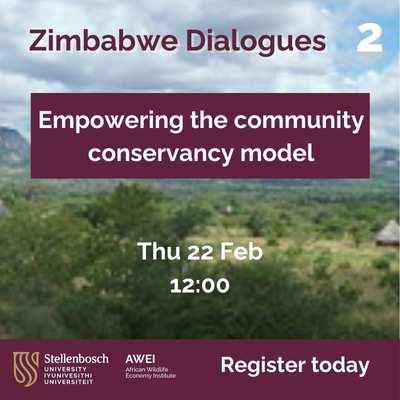
Empowering the community conservancy model
Zimbabwe
2nd of 5 one-hour dialogues on
What’s next for Zimbabwe’s wildlife economy?
Webinar recording
If Zimbabwe’s wildlife and natural resource regulations can be amended to allow for full ownership rights of communities over wildlife, this could open up new opportunities for wildlife enterprise development on communal land… Allowing communities to form authentic community-owned conservancies – as has been done successfully in Namibia – has the potential to increase the attractiveness of wildlife-based land use for communal land users…
The proposed community conservancy model offers enhanced opportunities for joint venture enterprises and agreements to be made directly with private investors. For example, private investors can reach agreements directly with communities to lease a portion of conservancy land for nature-based tourism or hunting and to develop lodges.
Growth opportunities for the wildlife sector exist in the development of wildlife-based land uses outside state PAs, particularly in communal areas and on private land, and potentially in resettlement areas. The main barriers are land tenure, lack of devolved appropriate authority, and high start-up costs.
(ZBE Report, p 48)
Related links
Related content
Get updates by email
Through impactful research, stakeholder engagement, and professional development, AWEI is supporting the wildlife economy across Africa. Please subscribe for occasional updates on our work and forthcoming events.
Sign up for a quarterly dose of AWEI insights
In a complex and changing world, AWEI generates strategic ideas, conducts independent analysis on wildlife economies, and collaborates with global scholar-practitioners to provide training and expertise for biodiversity conservation, climate resilience, and inclusive economic opportunities in Africa.
